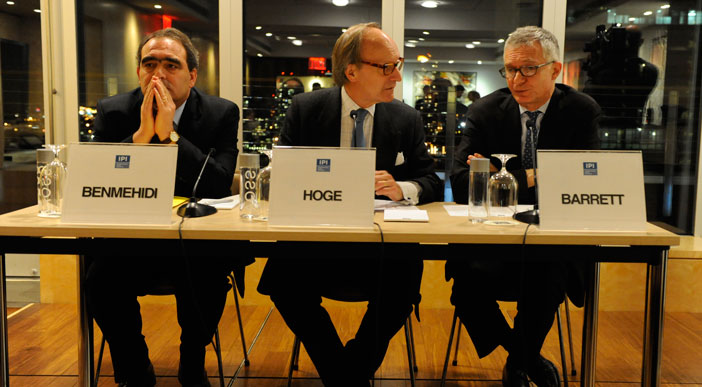
“Terrorism has always been with us. The solution is elusive, but we are moving towards it,” said Richard Barrett, Coordinator of the Al-Qaida/Taliban Monitoring Team, at the January 10, 2010 screening of The Terrorist Who Came Home, the first in a series of documentaries intended to highlight the stories of repentant terrorists.
The brief film examines the experiences of an Algerian fighter and the factors that influenced him to disavow the use of violence and reenter “mainstream” society.
The screening was hosted by the International Peace Institute in partnership with the United Nations Counter-Terrorism Implementation Task Force (CTITF) and featured a post-screening discussion between Mr. Barrett and Mourad Benmehidi, Permanent Representative of Algeria to the United Nations. The event was moderated by Warren Hoge, IPI Vice President for External Relations.
The documentary series was developed by the UN as part of an effort to assist member states in taking action to counter violent extremism by providing a platform for former terrorists and their victims to speak out against terrorism. Referring to the aim of the initiative, Mr. Barrett stated, “We must show that terrorism is not an acceptable solution and that is why we focus on both the victim and the perpetrator in the films.”
Ambassador Benmehidi noted three key elements of Algeria’s deradicalization and reconciliation measures that helped shape a positive environment for former fighters to cease violent activity. First, open letters or fatwas issued by credible Islamic scholars were used to establish a relationship of trust with ex-terrorists, giving them the necessary spiritual and religious support for their decision. Second, the perpetrators were assured that society, and most notably, their families, were prepared to accept them again. Finally, governments and institutions were encouraged to address the root causes of terrorism, including alienation, social marginalization and economic security.
In response to a question about the efficacy of Algeria’s program, Ambassador Benmehidi noted, “So far we are able to say that more than 10,000 terrorists have surrendered and are now living normal lives…[P]eople come in daily to turn themselves in.”
During the discussion, one audience member raised a question regarding the use of the word “terrorist,” given the lack of a universally accepted definition. In response, Mr. Barrett observed that his use of the word was shaped by a number of conventions and declarations at the UN regarding terrorism, as well as Security Council resolutions that define specific individuals or groups as terrorists. However, he agreed that too broad an application of the term could risk undermining its efficacy for international counterterrorism efforts.
The standing-room-only crowd included diplomats, UN officials, civil society groups and other experts.
The film was directed by Francis Mead of UNTV.
For more on IPI’s work on countering global counter terrorism, visit www.ipinst.org/terrorism
Related links:
A New Approach? Deradicalization Programs and Counterterrorism (Ellie Hearne and Nur Laiq, rapporteurs)







